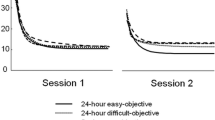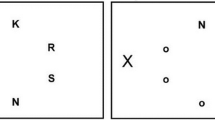Abstract
Previous studies have shown that motor sequencing skill can benefit from the reinstatement of the learning context—even with respect to features that are formally not required for appropriate task performance. The present study explored whether such context-dependence develops when sequence execution is fully memory-based—and thus no longer assisted by stimulus–response translations. Specifically, we aimed to distinguish between preparation and execution processes. Participants performed two keying sequences in a go/no-go version of the discrete sequence production task in which the context consisted of the color in which the target keys of a particular sequence were displayed. In a subsequent test phase, these colors either were the same as during practice, were reversed for the two sequences or were novel. Results showed that, irrespective of the amount of practice, performance across all key presses in the reversed context condition was impaired relative to performance in the same and novel contexts. This suggests that the online preparation and/or execution of single key presses of the sequence is context-dependent. We propose that a cognitive processor is responsible both for these online processes and for advance sequence preparation and that combined findings from the current and previous studies build toward the notion that the cognitive processor is highly sensitive to changes in context across the various roles that it performs.



Similar content being viewed by others
Notes
No-go trials are included to prevent participants from simply learning to start performing the sequence after the 1,500-ms preparation interval has ended. Instead, they have to await the (no-)go signal before deciding whether or not they should actually execute the sequence.
One may argue that under some conditions, motor buffer loading continues after sequence execution has started (on the basis of, for example, explicit knowledge). Indeed, such an assumption may be supported to some extent by the study of Verwey (2001) who showed that loading of the second motor chunk could be performed during execution of the first motor chunk. However, even then, one would not expect all key presses of the sequence to be affected, and thus expect to find an interaction with Key.
Short-term memory traces being built during actual stimulus presentation during the test trial, and long-term memory traces being built throughout the many repetitions of the sequence in the practice phase.
Improvement from the (last) practice block to the same context condition (i.e., no context changes between practice and test) was significant for the limited practice group (from 409 ms to 299 ms on average), F(1,7) = 6.98, p = .03, but not for the extended practice group (from 206 ms to 196 ms; p = .53). This indicates room for performance improvement for the limited practice group and near asymptote performance for the extended practice group.
References
Abrahamse EL, Verwey WB (2008) Context dependent learning in the serial RT task. Psychol Res 72:397–404
Anderson T, Wright DL, Immink MA (1998) Contextual dependencies during perceptual-motor skill performance: influence of task difficulty. Mem 6:207–221
Bo J, Seidler RD (2009) Visuospatial working memory capacity predicts the organization of acquired explicit motor sequences. J Neurophysiol 101:3116–3125
Bo J, Borza V, Seidler RD (2009) Age-related declines in visuospatial working memory correlate with deficits in explicit motor sequence learning. J Neurophysiol 102:2744–2754
Botvinick MM, Braver TS, Barch DM, Carter CS, Cohen JD (2001) Conflict monitoring and cognitive control. Psychol Rev 108:624–652
De Kleine E, Van der Lubbe RHJ (2011) Decreased load on general motor preparation and visual-working memory while preparing familiar as compared to unfamiliar movement sequences. Brain Cogn 75:126–134
Eich JE (1980) The cue-dependent nature of state-dependent retrieval. Mem Cognit 8:157–173
Godden DR, Baddeley AD (1975) Context-dependent memory in two natural environments: on land and underwater. Br J Psychol 66:325–331
Healy AF, Wohldmann EL, Parker JT, Bourne LE Jr (2005) Skill training, retention, and transfer: the effects of a concurrent secondary task. Mem Cognit 33:1457–1470
Kennerley SW, Sakai K, Rushworth MFS (2004) Organization of action sequences and the role of the pre-SMA. J Neurophysiol 91:978–993
Klapp ST (1995) Motor response programming during simple and choice-reaction time: the role of practice. J Exp Psychol Hum Percept Perform 21:1015–1027
Magnuson CE, Wright DL, Verwey WB (2004) Changes in the incidental context impacts search but not loading of the motor buffer. Q J Exp Psychol 57A:935–951
Park JH, Shea CH (2005) Sequence learning: response structure and effector transfer. Q J Exp Psychol 58A:387–419
Ruitenberg MFL, De Kleine E, Van der Lubbe RHJ, Verwey WB, Abrahamse EL (2012) Context-dependent motor skill and the role of practice. Psychol Res. doi:10.1007/s00426-011-0388-6
Sakai K, Kitaguchi K, Hikosaka O (2003) Chunking during human visuomotor sequence learning. Exp Brain Res 152:229–242
Shea CH, Wright DL (1995) Contextual dependencies: influence on response latency. Mem 3:81–95
Smith SM (1985) Background music and context-dependent memory. Am J Psychol 98:591–603
Sternberg S, Monsell S, Knoll RL, Wright CE (1978) The latency and duration of rapid movement sequences: Comparisons of speech and typewriting. In: Stelmach GE (ed) Information processing in motor control and learning. Academic Press, New York, pp 117–152
Verwey WB (1995) A forthcoming key press can be selected while earlier ones are executed. J Mot Behav 27:275–284
Verwey WB (1999) Evidence for a multi-stage model of practice in a sequential movement task. J Exp Psychol Hum Percept Perform 25:1693–1708
Verwey WB (2001) Concatenating familiar movement sequences: the versatile cognitive processor. Acta Psychol 106:69–95
Verwey WB (2003a) Effect of sequence length on executing familiar keying sequences: lasting segmentation and preparation? J Mot Behav 35:343–354
Verwey WB (2003b) Processing modes and parallel processors in producing familiar keying sequences. Psychol Res 67:106–122
Verwey WB (2010) Diminished motor skill development in elderly: indications for limited motor chunk use. Acta Psychol 134:206–214
Verwey WB, Abrahamse EL (2012) Distinct modes of executing movement sequences: Reacting, associating, and chunking. Acta Psychol 140:274–282
Verwey WB, Eikelboom T (2003) Evidence for lasting sequence segmentation in the discrete sequence-production task. J Mot Behav 35:171–181
Verwey WB, Abrahamse EL, Jiménez L (2009) Segmentation of relatively short keying sequences does not transfer to other sequences. Hum Mov Sci 28:348–361
Verwey WB, Abrahamse EL, De Kleine E (2010) Cognitive processing in new and practiced discrete keying sequences. Front Psychol 1:1–13
Verwey WB, Abrahamse EL, Ruitenberg MFL, Jiménez L, De Kleine E (2011) Motor skill learning in the middle-aged: limited development of motor chunks and explicit sequence knowledge. Psychol Res 75:406–422
Wright DL, Shea CH (1991) Contextual dependencies in motor skills. Mem Cognit 19:361–370
Wright DL, Shea CH, Li Y, Whitacre C (1996) Contextual dependencies during perceptual-motor skill acquisition: gone but not forgotten! Mem 4:91–108
Acknowledgments
We would like to thank Nadiya El-Sourani for her assistance in running the experiment. MR was supported by the Netherlands Organisation for Scientific Research (NWO) under contract number 400-07-097. EA was supported by the Netherlands Organisation for Scientific Research (NWO) under contract number 446-10-025 and by the Research Foundation—Flanders (FWO) under contract number 12C4712 N.
Conflict of interest
The authors declare that they have no conflict of interest.
Author information
Authors and Affiliations
Corresponding author
Rights and permissions
About this article
Cite this article
Ruitenberg, M.F.L., Abrahamse, E.L., De Kleine, E. et al. Context-dependent motor skill: perceptual processing in memory-based sequence production. Exp Brain Res 222, 31–40 (2012). https://doi.org/10.1007/s00221-012-3193-6
Received:
Accepted:
Published:
Issue Date:
DOI: https://doi.org/10.1007/s00221-012-3193-6




